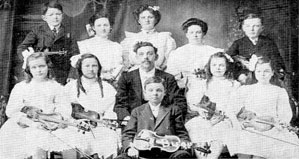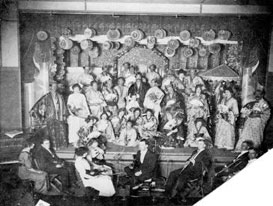|
AFTER
HAROLD H. HARRIS LEFT FOR WINNIPEG, Professor F. Gerald Racine, who had
a class of music pupils in Souris, arranged to spend two or three days
each week in Hartney and enrolled a large and enthusiast class there,
many of whom had advanced sufficiently under the guidance of previous
teachers to undertake the more advanced music study that Professor
Racine was able to give.
Professor Racine interested his pupils in the history of the composers
whose selections they played and inspired the musically gifted to
increased efforts. The concerts that he conducted annually were of a
progressively high standard and received the enthusiastic support of
the community. At first many in the audiences complained that they did
not enjoy music “without a tune,” but as the years passed, the
listeners gained an appreciation of the tone and harmony of musical
classics as well as the melody of simpler selections.
Among Professor Racine’s early pupils, Muriel Hill, Elsie Scharff and
the Woodhull sisters, Vera, Isabel and Ruth, were outstanding musicians
and became teachers of violin and piano.
Professor Racine in 1913, produced Gilbert and Sullivan’s “HMS
Pinafore” and the following year, “The Mikado” with a joint class of
Hartney and Souris pupils. For “The Mikado” the costumes were rented
from New York and with the stage setting, cost four hundred and fifty
dollars, a sum that seemed large to the town folk, but which was more
than covered by the returns.
These operas, concerts and musical productions of all sorts we Hartney
children accepted as our own, and like the other features of the town
absorbed as part of our heritage.
Adapted from The Mere
Living, page 164.

Professor Racine and some of his pupils; his son
sits in front of him.
Making
Music
Hartney history books abound with anecdotes about local musicians,
bands and various musical entertainments. Clearly this was an important
aspect of life in the community.
Not only was Professor Racine a well known instructor, he also led many
in the community in the creation of various major musical
entertainments. Gilbert and Sullivan’s The Mikado was a staple of these
kinds of endeavours in many small prairie communities. The Mikado
opened on March 14, 1885, in London, where it ran for 672 performances,
the second longest run for any work of musical theatre and one of the
longest runs of any theatre piece up to that time. Before the end of
1885, it was estimated that, in Europe and America, at least 150
companies were producing the opera. The Mikado remains the most
frequently performed Savoy Opera, and it is especially popular with
amateur and school productions, given its fine score and exotic appeal.
The work has been translated into numerous languages and is one of the
most frequently played musical theatre pieces in history.

Professor Racine and the Hartney cast of The Mikado.
|





